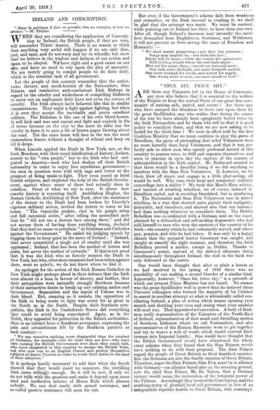IRELAND AND . CONSCRIPTION.
" Dana la politique til faut ne prendre rien au tragique, et taut au MIER%
WHEN they are considering the application of Conscrip- tion to Ireland, the British people, if they are wise, will remember Thiers' maxim. There is no reason to think that anything very awful will happen if we are only firm, just, and sane, and do not weep and try to wheedle, but show that we believe in the wisdom and fairness of our action and mean to be obeyed. Werhave right and a good cause on our side, and have no need to rely upon the plea of necessity. We are merely going to compel people to do their duty, which is the essential task of all government.
Let the people of this country remember that the antics, vows, threats, and mock-heroics of the Nationalists, Sinn Feiners, and combative anti-combatant Irish Bishops in regard to the cruelty and wickedness of compelling Irishmen to carry out an unpleasant duty have not even the excuse of novelty. The Irish always have behaved like this in similar circumstances. They enjoy a fight against fighting, but when it is over they accept the inevitable and prove excellent soldiers. The Irishman is like one of his own blood-horses. It will kick and rear and squeal and fight and explode in fits of terror because on the way to the meet its rider has the cruelty to force it to pass a bit of brown paper blowing about the road. Yet the same horse will face in the run the most tremendous fences without a thought of refusal and keep on till it drops.
When Lincoln applied the Draft in New York, not, as the Irish Members, with their usual falsification of history, declare, merely to his "own people;" but to the Irish who had emi- grated to America—men who had shaken off their British nationality in order to enjoy free republican government— the men in question were wild with rage and terror at the prospect of being made to fight. They even posed as loyal British subjects, and implored the help of the British Govern- ment, against whom many of them had actually risen in rebellion. Proof of what we say is easy. It shows how exactly history is repeating itself. Archbishop Hughes, the Roman. Catholic Archbishop of New York, after the resistance of the rioters to the Draft had been broken by Lincoln's vigorous military action, invited the rioters to come to his house. ".The venerable prelate, clad in his purple robes and full canonical attire," after telling the assembled mob that he " did not see a riotous face among them," and did not accuse them of having done anything wrong, declared that they had no cause to complain " as Irishmen and Catholics against the Government." He ended his hedging speech by begging them to keep quiet in the name of Ireland : " Ireland, that never committed a single act of cruelty until she was oppressed ; Ireland, that has been the mother of heroes and poets, but never the -mother of cowards." If that is not proof that it was the Irish who so fiercely resisted the Draft in New York, but who, after stern measures had been taken against them, went so quietly, we do not know where to find it.
An apologist for the action of the Irish Roman Catholics in New York might perhaps plead in their defence that the Irish were almost to a man in favour of slavery, and further, that their sympathies were naturally strongly Southern because of their instinctive desire to break up any existing nation and. Government. Separatism and the repeal of Unions was in their blood. But, amazing as it sounds, the opposition of the Irish to being made to fight was every bit as great in the South as. in the North. Despite their Southern sym- pathies, the Irish in the Confederate States did everything they could to avoid being conscripted. Again, as in the North, they appealed for protection to the British authorities. Here is an extract from a Southern newspaper, expressing the pain and astonishment felt by the Southern patriots at such conduct: " We can conceive nothing more disgraceful than the conduct of Irishmen, for example—but we trust they are few—who have been cursing the British Government ever since they could talk, who have emigrated to this country to escape the British Yoke, but who now run to an English Consul and profess themselves subjects of Queen Victoria in order to evade their duties in the land of their adoption."
It is perhaps hardly necessary to add that when the South showed that they would stand no nonsense, the unwilling Irish came willingly enough. So it will be now, if only we do not trifle with the question and make it depend upon some mad and ineffective scheme of Home Rule which• pleases nobody. We can deal easily with armed resistance, and so-called passive resistance will soon die out. But even if the Government's scheme fails from weakness and cowardice, or the Irish succeed in evading it, we shall be glad that the attempt was made. We must be content, while pointing out to Ireland her duty, to have done our own. After all, though Ireland's baseness may intensify the sacri- fices demanded from Englishmen, Scotsmen, and Welshmen, it will not prevent us from saving the cause of Freedom and Humanity :- " We shall march prospering,—not thro' her presence ; Songs may inspirit us,—not from her lyre ;
Deeds will be done,—while she boasts her quiescence, Still bidding crouch whom the rest• bade aspire : Blot out her name, then,—record one lost soul more, One task more declined, one more footpath untrod, One more triumph for devils, and sorrow for angels, One wrong more to man, one more insult to God ! "


























 Previous page
Previous page